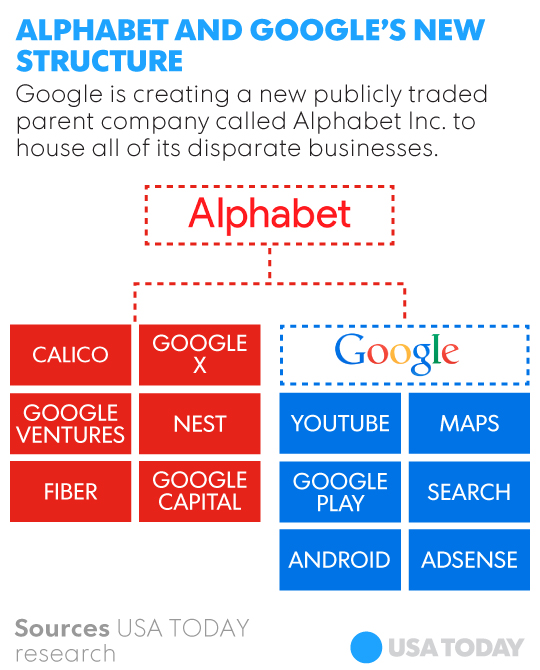In a sweeping overhaul of how one of the world’s most powerful technology companies operates, Google is creating a new publicly traded parent company called Alphabet Inc. to house all of its disparate businesses.
Alphabet will be run by Google co-founders Larry Page and Sergey Brin and Google will become a subsidiary of Alphabet with a new CEO: top Google executive Sundar Pichai.
“Our company is operating well today, but we think we can make it cleaner and more accountable,” Page wrote in a letter included in a regulatory filing on Monday afternoon.
The news announced after the close of trading on Monday took Wall Street by surprise. Google GOOG shares rose 6% in after-hours trading.
Alphabet will be a conglomerate, or “collection” of companies, the largest of which is Google. But Google itself will be “slimmed down,” excluding companies that are not part of its core Internet business.
Google will encompass the businesses that people typically associate with the brand, such as the Android and Chrome operating systems, YouTube and search.
What will fall outside the slimmer Google: newer, more experimental businesses such as the Internet of Things gadget maker Nest, the high-speed fiber-optic Internet project Fiber and Google’s effort to extend human life with Calico.
There will also be two financial businesses: Google Ventures, the venture capital arm, and Capital, which invests in private equity deals. Google X, which is the company’s experimental laboratory, will be run separately by Brin.
BERKSHIRE SIMILARITY
The structure is similar to Berkshire Hathaway, Warren Buffett’s massive empire that has a portfolio of disparate businesses that specialize in everything from real estate to underwear. It also gives Page the opportunity to step back from the day-to-day drudgery and focus on the bigger picture. Page told the Financial Times last year that he aspired to be like Buffett, overseeing a group of semi-independent leaders building new businesses under the Google umbrella.
“Fundamentally, we believe this allows us more management scale, as we can run things independently that aren’t very related,” Page said.
Page has long sought to reinvigorate the entrepreneurial culture inside Google. He also has taken steps with the hiring of new Google Chief Financial Officer Ruth Porat to be more transparent with investors. And, bottom line: Page appears ready to turn his attention to the next wave of technologies that Google is exploring while leaving the online advertising business in the capable hands of Pichai.
Google spokeswoman Gina Scigliano declined to comment.
“I think this sets up Google to be a much more diversified company,” said longtime Google observer Danny Sullivan, founding editor of MarketingLand.com. “It certainly allows Google to expand its mission. … It’s an excellent way to have multiple companies underneath that run as independent entities.”
What’s more, Google may be delivering on its promise of an era of greater transparency which was ushered in by Porat’s appointment.
Investors have been increasingly rattled by Google’s spending on its “moonshots,” those experimental projects such as driverless cars and delivering Internet access from high-altitude balloons. Now Google will keep those speculative businesses separate from the core Internet advertising business.
“We will see Alphabet and we will see Google as a business line. We can do the math. That’s good, more disclosure,” said BGC Partners analyst Colin Gillis. “That will put to rest some of the concerns that Google is overspending in non-productive areas.”
Google is also building a framework to give investors greater insight into its other businesses such as YouTube down the road, Gillis said.
But Pivotal Research Group analyst Brian Wieser cautioned that he’s not sure investors will get much more transparency from the new structure.
“On balance, incremental transparency into Google’s business is positive, although we remain uncertain as to exactly how much transparency will be provided, and therefore remain cautious on the degree to which this news should be viewed favorably,” Wieser wrote in a research note late Monday.
On the positive side of the ledger, Page is making room for talented executives to move up within Google, rather than leave, Sullivan said.
“It’s a smart way to ensure that you can keep talented executives,” he said.
NEW STRUCTURE
Page will be CEO of Alphabet, Brin will be president and Eric Schmidt will be executive chairman. Porat will become CFO of Alphabet and Google’s current directors will become directors of Alphabet.
A “strong” CEO will run each of the Alphabet businesses with assistance from Page and Brin, Page said. That includes Google, which will be run by Pichai, Page’s top lieutenant.
“We will rigorously handle capital allocation and work to make sure each business is executing well,” Page said.
As part of the business reorganization, Alphabet will begin “segment” reporting for its fourth-quarter financial results. Google financials will be broken out from the rest of the Alphabet businesses.
“This new structure will allow us to keep tremendous focus on the extraordinary opportunities we have inside of Google,” Page said.
Google will be a wholly owned subsidiary of Alphabet. The two share classes will remain GOOGL and GOOG.
PICHAI’S NEW ROLE
S&P Capital IQ analyst Scott Kessler praised the selection of Pichai, who has been a rising star at the Internet giant, leading to speculation in recent years that he would eventually succeed Page as CEO.
“Sundar Pichai as CEO is big for a variety of reasons,” Kessler said. “I am sure he has been offered a number of things at other places. To keep him is key.”
Page said Pichai was the natural choice to lead Google. Pichai has been running Google’s products. Now he will add YouTube to his responsibilities, with YouTube CEO Susan Wojcicki reporting to him.
“Sergey and I have been super excited about his progress and dedication to the company,” Page said. “I feel very fortunate to have someone as talented as him to run the slightly slimmed down Google and this frees up time for me to continue to scale our aspirations. I have been spending quite a bit of time with Sundar, helping him and the company in any way I can, and I will of course continue to do that.”
Other Google executives will be displaced in the restructuring. Google’s chief business officer Omid Kordestani will now become an adviser to Alphabet and Google.
As for the Alphabet name?
“It’s very powerful in its simplicity,” said Allen Adamson, North American chairman of Landor Associates, a major branding identity firm. “And it relates to Google’s mission. They’re going to have a collection of companies, just like an alphabet has a collection of letters.”
“Once you hear it, you’ll always remember it. You won’t have to ask how to pronounce it,” said Adamson.










